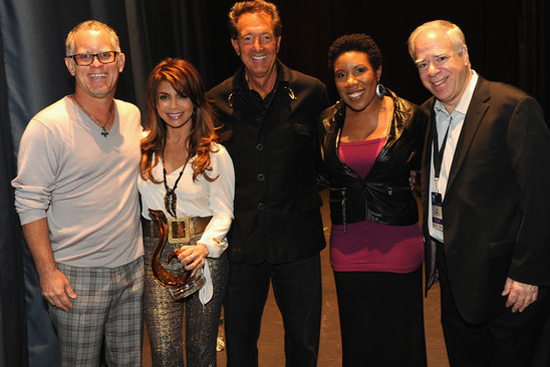

Pictured (L-R): Scott Siman (RPM Entertainment), Paula Abdul, Barry Adelman (Dick Clark Productions), singer Melinda Doolittle and moderator Fred Bronson. Photo: Rick Diamond/Getty Images for IEBA
Moderator Fred Bronson led a panel discussion with Paula Abdul (former American Idol judge), Melinda Doolittle (former AI contestant), Barry Adelman (Dick Clark Productions) and Scott Siman (President, RPM Entertainment) titled “How Reality TV has Affected the Music Industry,” Monday (10/8) in TPAC’s James Polk Theater during the IEBA conference. Bronson has guest‐starred on AI, CMT’s Next Superstar and has contributed writing for The American Music Awards, ACM Awards and multiple Dick Clark Productions concert specials.
The panel began by recognizing that talent competitions have had a longstanding history on TV, dating to the ’30s on radio with the show Major Bowes Armature Hour, which helped Frank Sinatra gain popularity in his group Hoboken Four. Country Music Hall of Fame singer Brenda Lee began on ABC’s TV program Ozark Jubilee (produced by Siman’s father). Chris Young, Miranda Lambert, and UMG Nashville’s new artist Kacey Musgraves all came from Nashville Star while numerous others have origins in shows produced by Nigel Lythgoe and Simon Cowell.
“There is a connection between music and TV to have an impact on careers,” said Siman. “We launched Julianne Hough’s single right after her performance on Dancing with the Stars with Apolo Ohno. She went on to sell 500k records. In 2000, Billy Gilman took off after a performance on the ACM Awards with Asleep At The Wheel. TV is a great partner and it’s here to stay. You can’t dismiss the impact it has on our format. If you’re stuck thinking it doesn’t, you’re not mining down far enough. We need to understand it.”
The panel discussed the impact of AI, which distinguishes itself from previous talent competitions by introducing a critical panel.
“AI was accused of ruining the industry,” said Abdul. “I had to remind every contestant that it is a TV show first, second and third. Talent comes fourth or fifth. Good singers were left behind for the extraordinarily great or wacky. It introduced me to a whole new aspect of humiliating people. These young adults would leave devastated and crying. It takes a lot to put it all out there.”
“AI changed everything for me,” said Doolittle. “It was a bootcamp. It was cool to have people sharing in your journey, but the attachment was so strong that people feel free to criticize wherever I go.”
“Dick Clark was criticized for American Bandstand,” commented Adelman. “Dick would say, ‘I’m a retail shopkeeper. I stock the shelves with what people want. Whatever sells, I put out.’ The people have created the stars, so viewers take ownership of them.”
For the contestants, TV creates a valuable channel for exposure, but does not necessarily translate to success in the industry. That still comes down to image and audience perception.
“You have to give the contestants a chance to make it after the show,” said Abdul. “They got the TV show part right, but picked some of the worst songs to be released at radio at the end. The tour schedule kept the winner from releasing a CD until the next season had began. By then, the audience’s interest was lower. So, I encouraged them to set up their own websites and YouTube channels.”
“It is really difficult to jump from reality TV to the recording industry,” said Siman. “Demand is high, and ultimately it comes back to hit singles. The issue is: do you have what it takes?”
“My catalog continue to sell because of the show,” added Abdul. “It’s a bullet train. Change was everywhere bringing pressure far beyond a normal artist. It all boils down to whether or not you have paid your dues.”
Following the panel discussion, Abdul received the IEBA Career Achievement Award.

About the Author
Eric T. Parker oversees operations and contributes editorial for MusicRow's print magazine, MusicRow.com, the RowFax tip sheet and the MusicRow CountryBreakout chart. He also facilitates annual events for the enterprise, including MusicRow Awards, CountryBreakout Awards and the Rising Women on the Row. eparker@musicrow.com | @EricTParkerView Author Profile


